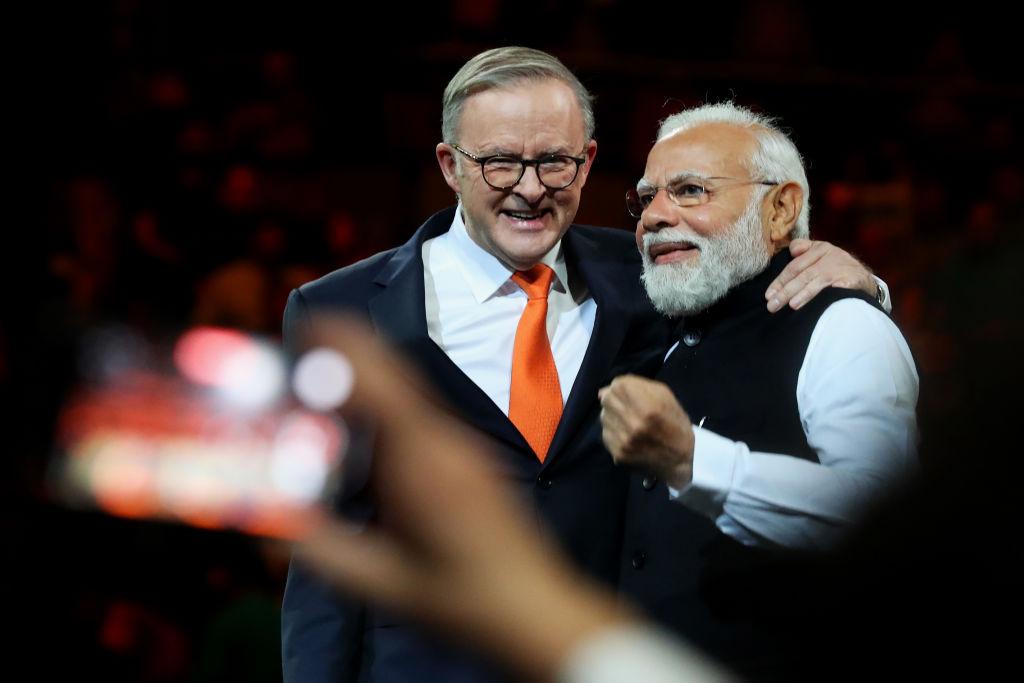Australia needs to be clear-eyed about India relationship after Modi visit
Posted By Baani Grewal on May 25, 2023 @ 11:00

An Australian official once told me that Australians struggle to think beyond the American-led Anglosphere and alliance.
There might have been some hyperbole in that remark. But certainly the struggle we have in properly understanding our burgeoning relationship with India—and India as a country—suggests that official was on to something.
Indian Prime Minister Narendra Modi’s visit to Sydney this week demonstrates that Australia and India are committed to one another, despite history working against us.
From the 1960s until 2014, the two countries had at best sporadic engagement.
It’s significant that Modi continued with the visit despite the cancellation of the Sydney Quad summit after US President Joe Biden was unable to travel, which then led to Japanese Prime Minister Fumio Kishida also pulling out.
It should not be forgotten that Modi’s trusted foreign minister, S. Jaishankar, has been to Australia three times in the past year.
This demonstrates the importance that India places on Australia—in terms of the political relationship, regional strategic alignment and the large diaspora of citizens and residents with Indian heritage. The decades in which the US has been our dominant strategic partner have shaped Australia to the point that we tend to see everything through that prism.
That helps to explain the predictable reactions we have seen to Modi’s visit: in particular, looking for inconsistencies between the two countries in terms of values, with critics pointing to human rights issues and arguing that New Delhi won’t provide military support if Beijing and Washington are heading towards a conflict, say over Taiwan.
The fact that both Australia and India are democracies is a very solid foundation for a good strategic relationship. But it should not be turned into more than that. India has its own interests, as does Australia. India, especially through the diplomacy of its foreign minister, is nothing less than open about that. India is never going to be an ally in the way the US is—but it doesn’t need to be in order to be a vital partner.
It’s not a mistake to point out that Australia and India share some values but not others. It is a mistake, however, to act like we need our partners to be identical or isolate ourselves. The test is not whether a partner is a democracy without flaws.
Rather, the test for our partnership is our commitment to a common set of strategic interests in the Indo-Pacific, to be addressed by a dual-track approach, involving offering our region viable, practical options for security and prosperity while constraining the most malicious activities of Beijing across territorial encroachment, technological oppression and foreign influence.
‘We have very different histories, of course,’ Prime Minister Anthony Albanese said [1] this week when asked about India’s relationship with Russia. ‘India has been a leader of the Non-Aligned Movement for such a long period of time. But India is a great supporter of peace and security and stability in our region.’
And in this regard India has the heft in population and influence in the region. Evidence of this can be seen in Modi’s invitation to the G7 in Japan and his visit to Papua New Guinea before coming to Australia, where he met with 14 Pacific leaders under India’s Forum for India–Pacific Islands Cooperation. Notably, PNG Prime Minister James Marape referred to Modi as ‘the leader of the global south’.
In his statement after meeting Modi on Wednesday and in his media interviews, Albanese sensibly didn’t overstate shared values—despite getting a barrage of questions in interviews about Indian democracy and New Delhi’s relationship with Moscow. Indeed, in his statement issued on Wednesday morning he mentioned neither democracy nor values.
Albanese and Modi’s meeting on Wednesday yielded mainly practical areas of cooperation: trade and investment, migration, green hydrogen, a new consulate and so forth.
But the overwhelming benefit of the partnership is that Australia doesn’t want a region dominated by one power. It wants an inclusive region, in which power is shared and aggression and coercion are deterred. And it understands that it has to work with others, including India and Southeast Asian countries.
The strength and maturity of the relationship is reflected in the fact that the two countries can discuss their individual and collective interests, which includes open discussion of the tensions in the relationship. Indeed one of the biggest changes in the past few years is that the differences can be discussed. The relationship is now that intimate and joins a short list of countries in that category for Australia, including the US, the UK and Japan.
So, where does the relationship go from here? Defence cooperation and trade are moving at a very strong pace, as is work through the Quad grouping with Japan and the US. The visit going ahead despite everything else around it being upended shows that the Australian and Indian governments are clear-eyed about what they need individually and collectively.
The challenge for Australian foreign policy is to get more creative and find a proper place for a country like India that is not politically or culturally as resonant as the US is for Australians, and is not in our immediate region, which is Southeast Asia and the Pacific—but is still a clear strategic partner in the pursuit of this vision for the region.
Article printed from The Strategist: https://aspistrategist.ru
URL to article: /australia-needs-to-be-clear-eyed-about-india-relationship-after-modi-visit/
URLs in this post:
[1] said: https://www.pm.gov.au/media/television-interview-abc-news-breakfast-10
Click here to print.